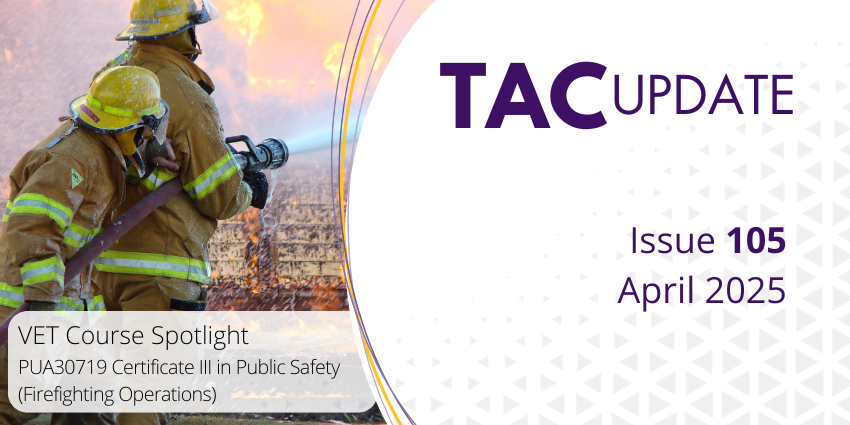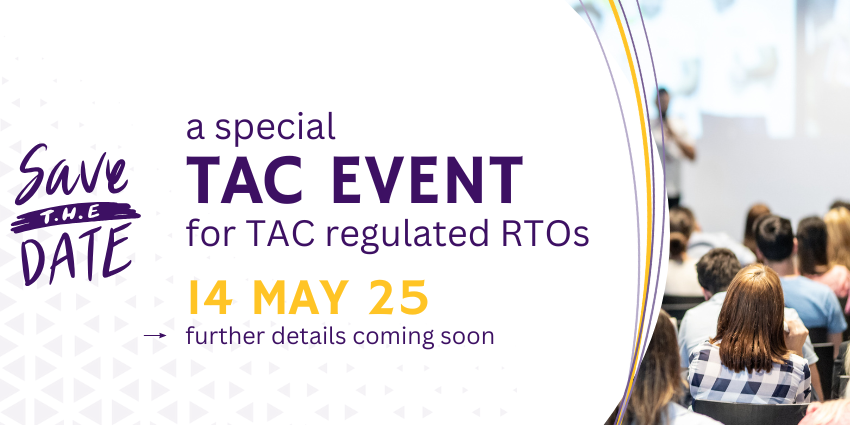
Welcome to the April Update
The Training Accreditation Council (Council/TAC) is proud to host this year's event for TAC regulated RTOs, titled The Next Chapter: Insights into the 2025 Standards.
The theme of the event and the focus of the workshops will be understanding and managing the implementation of the Standards for Registered Training Organisations 2025 (2025 Standards). This event is designed to equip RTOs with the knowledge and tools needed to navigate these changes successfully.
Event Highlights
This event will provide valuable insights into the 2025 Standards through a series of engaging workshops including:
Transitioning to the Revised Standards for RTOs 2025
This workshop will equip RTOs with the critical information needed to navigate the transition, implementation, and compliance with the 2025 Standards. Participants will understand the changes, the rationale, and how to manage the transition effectively.
Unpacking Governance: Leadership, Accountability, and Risk Management
Designed for those in managerial roles, this workshop aligns with Outcome Standard 4.4. It will cover key topics such as Fit and Proper Person Requirements, making informed decisions, leading a culture of integrity, and managing risks to VET students, staff, and the RTO.
Designing and Delivering Quality Training: Insights from Outcome Standards 1.1 and 1.2
This workshop, designed for Trainers and Assessors, focuses on engaging training methods that accommodate diverse learning styles and needs, ensuring alignment with training package requirements and industry standards.
Why Attend?
The event is an invaluable opportunity for TAC regulated RTOs to explore key topics designed to assist RTOs achieve quality training, network with other RTOs and meet with Council members.
An invitation to register will be sent to your RTO's Legally Responsible and Registration Contact Person(s) shortly. We look forward to seeing you there!
TAC Education Program
Understanding the VET Sector Clip
The Vocational Education andTraining (VET) Sector is a large and complex sector comprised of many stakeholders, frameworks, and registers. TAC has developed this short clip which unpacks its various components.
This clip covers:
- Benefits of being an RTO;
- VET Regulators;
- TAC Regulatory Framework;
- Governance and Regulation of VET in Australia; and
- Other Agencies in the Sector.
Updates to the Online Guidance Hub
Updated Fact Sheets
The following Fact Sheets, aligned with the 2025 Standards, are now available:
Feedback, Complaints and Appeals
RTOs must implement transparent feedback, complaints and appeals policies that enable students and clients to be informed of their rights and the RTO’s responsibilities under the 2025 Standards. Any complaint or appeal is required to be recorded, acknowledged and dealt with fairly, efficiently and effectively.
This Fact Sheet aligns with Outcome Standards 2.7, 2.8, 4.4. and Compliance Requirement 17 Third Party Arrangement and suggests strategies for RTOs to implement, which may assist in reducing the likelihood of complaints and appeals.
Child Safe Organisations
Ensuring a child safe training environment is a legal and ethical responsibility. By implementing strong policies, conducting staff training, fostering a culture of respect, and maintaining compliance, RTOs can provide a safe, inclusive, and protective space for young students.
This new Child Safe Organisations Fact Sheet provides further information and guidance to RTOs on Outcome Standard 4.3 in relation to the National Principles for Child Safe Organisations.
Focus Article: Reasonable Adjustment and Inclusive Practice
In today's diverse educational landscape, ensuring equitable access to vocational education and training (VET) for all students is paramount. The 2025 Standards emphasise the importance of creating inclusive environments where every student can thrive, regardless of their background or circumstances. This article highlights the significance of reasonable adjustment in achieving this goal as outlined in Outcome Standard 2.4.
Understanding Reasonable Adjustment
Reasonable adjustment refers to modifications made to the learning environment, training delivery, or assessment methods to enable students with disabilities or ongoing ill health to participate in education. These adjustments are not intended to give an unfair advantage but to level the playing field, ensuring that all students can access and succeed in their educational pursuits.
There are several critical components of reasonable adjustment including:
- Legal Obligations: RTOs must comply with the Disability Discrimination Act 1992 and the Disability Standards for Education 2005, which mandate that education providers make reasonable adjustments for students with disabilities.
- Types of Adjustments: Adjustments can include flexible course activities, additional support, and reasonable substitutes for course requirements that a student cannot meet due to their disability.
- Decision-Making Process: When determining reasonable adjustments, RTOs should consider the student's disability, the impact of the adjustment on the student and others, and whether the adjustment would impose an unjustifiable hardship on the RTO.
Implementing Reasonable Adjustments
To effectively implement reasonable adjustments, RTOs should follow a structured approach which could include:
- Preparation: Before making adjustments, RTOs should gather relevant information about the student's needs and consult with the student to understand their specific requirements.
- Consultation: Engaging in open dialogue with students, their families, and relevant professionals ensures that the adjustments made are appropriate and effective.
- Implementation: Once adjustments are determined, RTOs should implement them promptly and monitor their effectiveness, making further modifications as needed.
- Record-Keeping: Maintaining detailed records of the adjustments made and their outcomes is essential for compliance and continuous improvement.
The Impact of Reasonable Adjustment
The implementation of reasonable adjustments has far-reaching benefits. For students with disabilities or ongoing ill health, these adjustments can mean the difference between exclusion and full participation in VET. Reasonable adjustments ensure that all students have the opportunity to succeed in their educational pursuits.
Moreover, fostering an inclusive educational environment benefits the entire student body by promoting diversity, understanding, and mutual respect. It prepares all students to thrive in a diverse society and workforce, enhancing their social and economic prospects.
For more detailed information, please refer to the Fact Sheet on Reasonable Adjustment and Inclusive Practice. Additionally, Outcome Standard 2.4 in the Online Guidance Hub provides insights on Intent, Self-Assurance Considerations and Reflective Questions.
Ensuring Integrity: Protecting VET Quality from Unregistered Entities
The VET sector is crucial in developing skilled professionals across diverse industries. During periods of skill shortages and high training demand, some individuals or organisations may exploit the market by falsely claiming to be RTOs without proper registration with the Council or another VET regulator. These entities, known as 'purporting' RTOs, can undermine the VET system's credibility, leading to substandard education and the issuance of fraudulent certificates or statements of attainment.
Every legitimate RTO has a unique RTO code, which can be verified on training.gov.au. RTOs must display their code on marketing materials for easy identification, and any third parties must clearly identify their associated RTO. This added scrutiny helps stakeholders distinguish genuine RTOs from fraudulent ones.
The Council reminds RTOs and stakeholders that they can report suspected cases of purporting through the Council's complaints process. This process is designed to be accessible and straightforward. Upon receiving complaints, an investigation is conducted to verify the authenticity of the individuals or organisations. If complaints about purporting are substantiated, actions will be taken to protect the interests of students and the broader VET sector.
General information related to verified complaints may be published to further educate the sector on this issue, fostering transparency and awareness.
(Note: Under the Vocational Education and Training Act (1996), 'purporting' refers to organisations or individuals that claim to be RTOs without proper registration with a VET regulator or those registered but not authorised to confer the course or qualification.)
Other important Updates
Copyright webinar: Finding and Using Free Materials for Training
The Department of Training and Workforce Development are providing free webinars to private RTOs to assist them in finding, using and managing a large range of free resources. Topics include open educational material, Creative Commons, easy attributions, and appropriate consent forms for creative inhouse content.
For more information and to register click here.
2025 Australian Training Awards Nominations
The Australian Training Awards are the national awards for the VET and skills sector and celebrates individuals, businesses, and RTOs who lead the way in delivering excellence, innovation, and positive outcomes in Australia’s VET system.
The finalists from a number of categories will compete for national recognition at the annual Australian Training Awards gala event, joining the State and Territory Award winners to celebrate VET excellence across Australia.
Nominations can be submitted via the Australian Training Awards website until 31 May 2025.
NCVER ‘No Frills’ Registrations Open
Registrations are now open for the 34th National Vocational Education and Training (VET) Research Conference ‘No Frills’ which will be co-hosted with TAFE Queensland at the Robina Events Centre on the Gold Coast from Wednesday 9 to Friday 11 July 2025.
'No Frills' provides an opportunity to showcase research to VET practitioners and build the capacity of researchers. It provides participants with a forum for the exchange of ideas and knowledge, as well as a chance to be a part of an event that encourages thought-provoking presentations and networking opportunities in a relaxed and friendly environment.
Further information is available on NCVER’s website.
Latest NCVER Reports
NCVER has released the following report:



